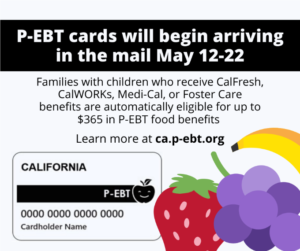Hunger Intensifies for Families With Kids Out of School
Before the pandemic, over 40,000 families in San Francisco and Marin had children who received free or reduced-price meals each day at school. This helped ease the financial burden on hard-working low-income families and ensured that kids were getting the nutrition they needed to thrive in and out of school.
Since schools closed, these families have been scrambling to find resources to feed their kids when work has become scarce and support networks have been strained. We see so many of these parents picking up groceries at our Pop-up pantries while they wait for unemployment insurance or CalFresh benefits to arrive.
New research explores how dramatically the economic collapse has deepened food insecurity, with nearly one in five children not getting enough to eat. That rate is three times higher than in 2008, at the height of the Great Recession. Our pantry programs help, but we need a stronger social safety net to help families in crisis.
Pandemic EBT (P-EBT) Can Help
Thanks to fierce advocacy from anti-hunger groups including the Food Bank, families whose children typically receive free school lunch will now be able to receive up to $365 per child on a debit card to purchase food through a new program called Pandemic EBT (P-EBT). Enacted in March in the Families First Coronavirus Response Act, P-EBT was created to help compensate for those missing school meals. Families whose children receive CalFresh, Medi-Cal, or are in foster care will automatically receive this card in the mail between May 8 and May 22. For those who don’t automatically qualify, a short application will be available on May 22.
Families will be able to use this money to purchase groceries at most grocery stores, farmers’ markets, and at select online retailers. Receiving P-EBT does not jeopardize a person’s immigration status and is not included in public charge determinations. Families are also still encouraged to pick up free to-go meals from school meal sites in their neighborhoods.
More Action is Needed to End Hunger
This will be a tremendous help for many struggling to put food on the table, but it is insufficient to fill the staggering need among families in our community. As the saying goes, “it takes a village to raise a child,” and it will take all of us to urge lawmakers to prioritize policy solutions to feed our children, too.
Please, call your lawmakers (202-224-3121) and urge them to include new investments in SNAP that will help the economy rebound from the impact of the pandemic and ensure the well-being of millions of children. Ask them to:
- boost the SNAP maximum benefit by 15%;
- increase the minimum monthly SNAP benefit from $16 to $30;
- suspend any administrative actions that eliminate or weaken SNAP benefits.



Share